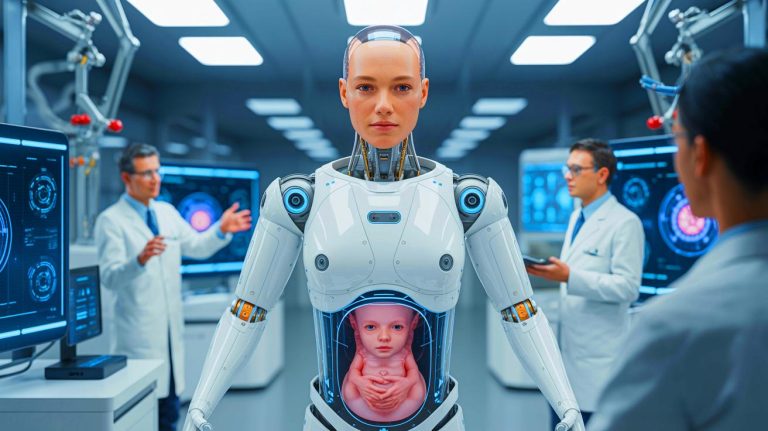| IN A NUTSHELL |
|
In a remarkable fusion of technology and biology, Guangzhou-based Kaiwa Technology is poised to introduce a groundbreaking innovation: the world’s first pregnancy-simulating robot. Announced by the company’s founder and CEO, Zhang Qifeng, this humanoid robot is designed to replicate the process of conception through delivery. Priced below $14,000, this technological marvel has sparked a flurry of reactions online, ranging from enthusiastic support to ethical concerns. As the world grapples with declining birth rates and evolving family structures, this invention raises profound questions about the future of reproduction and the role of technology in human life.
Revolutionizing Reproduction: The Technology Behind
The pregnancy-simulating robot by Kaiwa Technology is more than just a scientific curiosity; it represents a significant leap in artificial womb technology. Unlike traditional incubators, the robot’s womb contains artificial amniotic fluid, with nutrients delivered to the fetus via a sophisticated hose system. According to Zhang Qifeng, this allows for an interaction between the robot and a real person to facilitate pregnancy. Zhang emphasizes that the artificial womb technology is mature and ready to be integrated into the robot’s abdomen. This innovation targets young individuals who wish to have children without undergoing biological pregnancy, offering a new avenue for family planning.
The development of this robot also addresses the pressing issue of population decline. Zhang has publicly stated his intention to combat this demographic challenge by providing a solution for those who want to have children outside of traditional marriage. By offering an alternative to illegal commercial surrogacy, the pregnancy robot could meet the needs of a diverse range of potential parents, advancing reproductive options in unprecedented ways.
Ethical and Legal Considerations
The announcement of the pregnancy robot has ignited a heated debate surrounding its ethical implications. Critics argue that allowing a fetus to develop in a robotic womb could be considered unethical, as it disrupts the natural bond between mother and child. Concerns have been raised about the potential psychological effects on children born through this method. Additionally, there are questions about the biological sources involved in creating babies using this technology. While some see these innovations as progress, others view them as a fundamental violation of human ethics.
Kaiwa Technology is engaging with local authorities in Guangdong Province to address these concerns. The company has submitted policy proposals and conducted forums to navigate the ethical and legal landscape surrounding their invention. As the technology moves closer to commercialization, the need for clear regulations becomes increasingly urgent, ensuring that advances in reproductive technology align with societal values and legal frameworks.
Public Reception and Potential Impact
The public response to the pregnancy-simulating robot has been polarized. On one hand, some individuals welcome the development as a means to alleviate the physical burdens of pregnancy for women. These supporters argue that the robot could empower those who face infertility challenges, offering a viable path to parenthood. One person, for instance, shared their personal struggle with unsuccessful artificial insemination attempts, expressing hope that this innovation could finally fulfill their desire to have a child.
On the other hand, detractors express concern over the detachment from traditional family structures and the potential societal implications. The hashtag “#World’s First Pregnancy Robot to Launch Within a Year” has trended on Chinese social media, reflecting widespread interest and debate. Zhang’s interview on Douyin has garnered nearly 4,000 comments, illustrating the intense engagement and diverse opinions surrounding this controversial topic.
Implications for Infertility Solutions
China’s rising infertility rate, which increased from 11.9% in 2007 to 18% in 2020, underscores the demand for innovative reproductive solutions. Major cities like Beijing and Shanghai have responded by including artificial insemination and in vitro fertilization in medical insurance coverage, supporting couples facing infertility. The introduction of the pregnancy-simulating robot could further expand these options, providing an alternative for those unable to conceive through conventional means.
In 2022, researchers in Jiangsu Province developed an AI “nanny robot” to monitor embryos in artificial wombs, highlighting China’s investment in reproductive technology. However, legal restrictions currently limit the development of human fetuses in artificial wombs beyond two weeks. As Kaiwa Technology progresses with its pregnancy robot, these legal constraints will play a critical role in shaping the future of artificial reproduction in China and beyond.
The world stands on the brink of a technological revolution in reproduction, with Kaiwa Technology’s pregnancy-simulating robot leading the charge. As society navigates the ethical, legal, and personal ramifications of this innovation, critical questions arise: How will these advancements reshape our understanding of family, parenthood, and the human experience? And what role should technology play in the most intimate aspects of our lives?
Did you like it? 4.4/5 (22)






Is this robot really capable of carrying a pregnancy to term? 🤔
Wow, $14,000 seems cheap for a pregnancy robot! Is it safe though?
Just when you think you’ve seen it all, China surprises us again. 🤖
Will this robot have any legal rights as a “mother”?
Why do I feel like we’re living in a sci-fi movie? 😂
Can it make breakfast too? Asking for a friend. 🍳